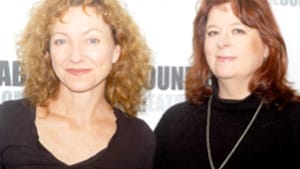Stay in the Loop
BSR publishes on a weekly schedule, with an email newsletter every Wednesday and Thursday morning. There’s no paywall, and subscribing is always free.
Actors without audiences
Rebeck's "The Understudy' in New York

The Understudy, the new pointy comedy by that queen of pointy comedy, Theresa Rebeck (Mauritius, Spike Heels, Bad Dates), is about unappreciated people. In theater, that would be the understudies. And if there's anyone more underappreciated than an understudy, it's a stage manager. They're all the invisible people who make a show possible, but who are never applauded, never seen.
Rebeck, in a magnanimous gesture, has made them the stars. "Was that sarcasm?" one character asks. The deadpan reply from another character comes back: "Sarcasm in show business?"
Just as Stoppard made Rosencrantz and Guildenstern the stars of Hamlet by moving the dramatic focus to the wings, here Rebeck focuses on a rehearsal where the understudy, Harry (Justin Kirk), is supposed to learn the role by playing opposite the actor he would— if anybody ever got sick on Broadway— replace. The lead in that play is a movie star ($22 million per film) who is never seen.
Casting sarcasm?
Jake, the second banana (was that sarcasm? They keep eating the banana props) is also a movie star, whose action flick grossed $67 mil in its first weekend. Jake is played by Mark-Paul Gosselaar, TV star of TNT's "Raising the Bar" and formerly of "NYPD Blue," who is making his New York stage debut. (Is that casting sarcasm?)
Turns out Harry the understudy was engaged to Roxanne the stage manager (the superb Julie White) and walked out on her just before the wedding, six years ago. Her wedding dress still hangs in her closet, "like a wound on a hanger."
And so the play shifts between their romance/regret/rage drama and the competition/contempt drama of the two actors (representing the competition/contempt of stage vs. screen, art vs. money). And The Understudy shifts between their backstage lives and the play they're rehearsing: a long-lost three-hour play by Kafka (trials, judges, dungeons, storms— the usual). This juxtaposition allows the actors to swing virtuosically between characters, between plots, and between styles, requiring lots of tricky tonal shifts. (Watching how the action-hero Jake pulls a gun and how Harry pulls a gun is an acting class in itself.)
A feminist acting class
Roxanne, we learn, used to be a fine actor, but stage manages so she can make a living; when she makes a case for the other characters in this Kafka play being female by acting them out, White runs through a variety of scenes so impressively that we realize we've just watched another acting class. Not to mention a short course in feminism.
Scott Ellis's direction balances the pathos, the hilarity, the desperation and the exasperation of The Understudy. He also manages to walk the literary tightrope between the classic Kafka-esque and the ultra-contemporary issues and themes of the Rebeck-esque. It's rare that a comedy this entertaining is also this human; the last dance among the three principals (is that sarcasm?) is surprisingly moving.
I wonder: Do the understudies ever go on for the stars of The Understudy? Just for the record, those understudies are Josh Casaubon and Jenn Harris. The stage manager is Eileen Ryan Kelly and the production stage manager is David H. Lurie. No sarcasm intended.
Rebeck, in a magnanimous gesture, has made them the stars. "Was that sarcasm?" one character asks. The deadpan reply from another character comes back: "Sarcasm in show business?"
Just as Stoppard made Rosencrantz and Guildenstern the stars of Hamlet by moving the dramatic focus to the wings, here Rebeck focuses on a rehearsal where the understudy, Harry (Justin Kirk), is supposed to learn the role by playing opposite the actor he would— if anybody ever got sick on Broadway— replace. The lead in that play is a movie star ($22 million per film) who is never seen.
Casting sarcasm?
Jake, the second banana (was that sarcasm? They keep eating the banana props) is also a movie star, whose action flick grossed $67 mil in its first weekend. Jake is played by Mark-Paul Gosselaar, TV star of TNT's "Raising the Bar" and formerly of "NYPD Blue," who is making his New York stage debut. (Is that casting sarcasm?)
Turns out Harry the understudy was engaged to Roxanne the stage manager (the superb Julie White) and walked out on her just before the wedding, six years ago. Her wedding dress still hangs in her closet, "like a wound on a hanger."
And so the play shifts between their romance/regret/rage drama and the competition/contempt drama of the two actors (representing the competition/contempt of stage vs. screen, art vs. money). And The Understudy shifts between their backstage lives and the play they're rehearsing: a long-lost three-hour play by Kafka (trials, judges, dungeons, storms— the usual). This juxtaposition allows the actors to swing virtuosically between characters, between plots, and between styles, requiring lots of tricky tonal shifts. (Watching how the action-hero Jake pulls a gun and how Harry pulls a gun is an acting class in itself.)
A feminist acting class
Roxanne, we learn, used to be a fine actor, but stage manages so she can make a living; when she makes a case for the other characters in this Kafka play being female by acting them out, White runs through a variety of scenes so impressively that we realize we've just watched another acting class. Not to mention a short course in feminism.
Scott Ellis's direction balances the pathos, the hilarity, the desperation and the exasperation of The Understudy. He also manages to walk the literary tightrope between the classic Kafka-esque and the ultra-contemporary issues and themes of the Rebeck-esque. It's rare that a comedy this entertaining is also this human; the last dance among the three principals (is that sarcasm?) is surprisingly moving.
I wonder: Do the understudies ever go on for the stars of The Understudy? Just for the record, those understudies are Josh Casaubon and Jenn Harris. The stage manager is Eileen Ryan Kelly and the production stage manager is David H. Lurie. No sarcasm intended.
What, When, Where
The Understudy. By Theresa Rebeck; directed by Scott Ellis. Through January 3, 2010 at the Laura Pels Theatre Steinberg Center for Theatre, 111 West 46th St., New York. (212) 719-1300 or www.roundabouttheater.org.
Sign up for our newsletter
All of the week's new articles, all in one place. Sign up for the free weekly BSR newsletters, and don't miss a conversation.
 Toby Zinman
Toby Zinman